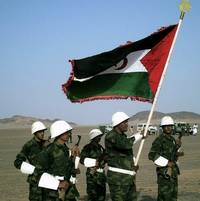Introduction
In a speech on Nov. 6, 2008, King Mohammed VI of Morocco announced his plan to decentralize the kingdom, including the Western Sahara. The date marked the 33rd anniversary of the Green March, when 350,000 unarmed Moroccans crossed into Spain's former Sahara colony, now internationally referred to as the Western Sahara, to reassert the kingdom's historic ties to the region. Since then, an ongoing territorial dispute has pitted the region's Polisario independence movement, backed with arms and financing by neighboring Algeria, against the central government in Rabat.
The Polisario Front was created in 1973 with the goal of ending the Spanish occupation of the Western Sahara. Beginning in 1975, following Spain's departure, the group shifted the focus of its efforts to opposing the subsequent annexation of the region by Morocco and Mauritania. In the same year, the Algerian government began providing the Polisario with support, while the International Court of Justice ruled that the people of the Western Sahara had the right to self-determination. Morocco's claims of historic ties to the Sahrawi (Arabic-Amazigh) tribes of the region are disputed by the Polisario Front, which maintains that the Western Sahara's indigenous inhabitants are historically distinct in terms of their experience and culture.

